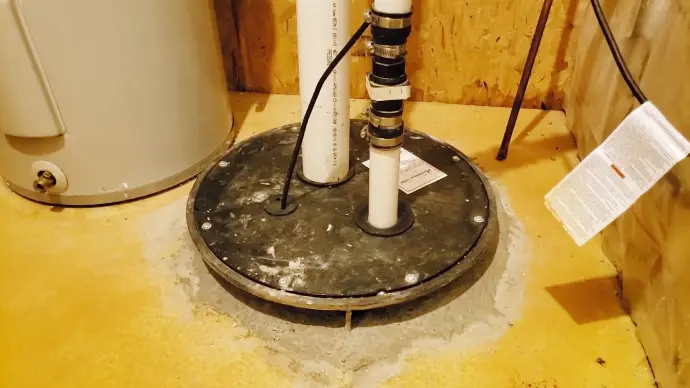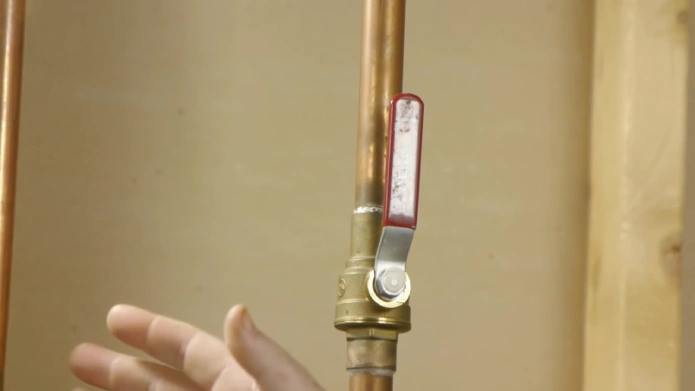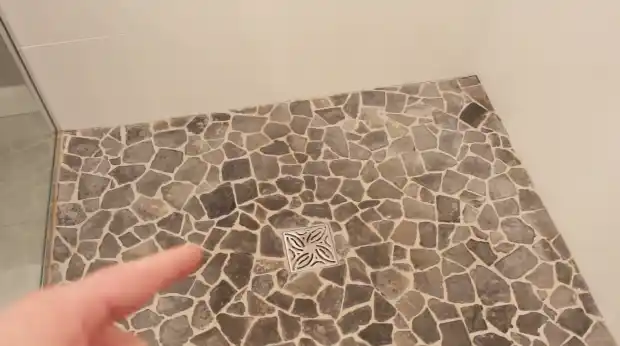Last Updated on May 24, 2023
As a homeowner, you may have come across an unpleasant scent emanating from your sump pump.
While this device is typically meant to protect against water damage and keep dryness intact, it can sometimes exude foul smells that leave you feeling worried and put off.
If your nose is detecting an unpleasant stench, it could be any variety of malodorous culprits. Debris in the pit and moldy mildew from blocked vents are common suspects but don’t forget about dirty filters or even a dead animal down there adding to the odor.
Sewage backup can contribute too, as well as unclean discharge pipes. Other contributors, such as rust and corrosion, old or worn-out equipment, and improper installation, can also cause a sump pump odor.
Don’t let nasty odors ruin your day. We’ll uncover the mystery behind why sump pumps can start smelling and how to prevent it from happening in the future.
Why Does My Sump Pump Smell: Serious Reasons

When you notice a stench coming from your sump pump, don’t worry. There’s likely an easy explanation, and it doesn’t involve ghosts. Check out these common causes for the odor.
1. Accumulated Debris
Over time, debris and other organic materials can find their way into the sump pump pit, causing a buildup of filth and a nasty smell. The debris can come from various sources, such as soil, leaves, insects, pet hair, and dust.
As the debris accumulates, the sump pump’s float switch can obstruct it, causing it to malfunction or stop working altogether. Side note, that’s why regular maintenance is essential to keep the accumulated debris under control.
2. Mold and Mildew
Moisture is the perfect breeding ground for mold and mildew, and it’s no different in the sump pump pit.
The wet and humid environment provides an ideal habitat for mold and mildew spores to grow and multiply, eventually leading to a musty or earthy smell.
Additionally, mold and mildew can cause serious health problems, especially in people with allergies, asthma, or weakened immune systems.
3. Bacteria Growth
The stagnant water in a sump pump pit creates an ideal environment for bacteria to thrive. Bacteria can feed on organic materials such as debris and dead animal matter, leading to a foul smell.
Moreover, bacteria growth can pose serious health threats, especially for individuals with respiratory problems or open wounds that may come into contact with contaminated water.
4. Blocked Vents
Sump pumps rely on proper air circulation to function optimally. If the vents that allow the air to flow become blocked or obstructed, the air cannot circulate, leading to a musty or damp smell.
The blockage could be caused by debris or dirt, or it could be due to improper installation. It’s essential to check the vents regularly to ensure they are open and debris-free to avoid vent blockage-related issues.
5. Dead Animals
The presence of dead animals in the sump pump pit can result in an unbearable stench due to the decomposition process. Small rodents like mice, rats, or shrews may accidentally fall into the pit and drown in the water, causing odors.
As the carcass breaks down, it releases a gas known as putrescine, which smells like rotten eggs. Additionally, the buildup of bacteria and other decomposers around the animal body can produce other stinky gasses such as methane, sulfur dioxide, and ammonia.
6. Sewage Backup

When sewage water backs up into the sump pump pit due to clogs, blockages, or flooding, it can emit an unpleasant odor. Sewage contains various organic and inorganic compounds that can produce a pungent smell.
The most common causes of sewage backup include tree roots growing into the sewer lines, flushing of inappropriate items down the toilet, and blockages in the sewer system. There’s a strong smell to sewage, and it contains harmful bacteria, viruses, and parasites.
7. Dirty Discharge Pipes
Over time, the discharge pipes leading from the sump pump can become clogged with sludge, sediment, and other debris. As a result, the pump may struggle to discharge water, leading to a sewer smell.
Aside from that, if the discharge pipes are poorly designed, they may not provide enough slope or ventilation to allow proper water flow and drainage. The accumulation of stagnant water and debris can cause bacterial growth and mold, leading to bad odors.
8. Rust and Corrosion
Sump pumps function on metal components such as the impeller, motor, and basin. However, moisture, humidity, and chemicals exposure can cause rust and corrosion, leading to a metallic or musty smell.
The corrosion process can also weaken the pump’s mechanical parts, reducing its efficiency and longevity.
Some of the most common causes of rust and corrosion include high humidity levels, chemical exposure, and poor maintenance practices. Proper maintenance and regular cleaning can help reduce the chances of rust and corrosion.
9. Chemicals and Pollutants
Chemicals and pollutants can significantly impact the functionality of your sump pump, causing it to produce an unpleasant odor. Household chemicals, pesticides, and fertilizer runoff are just some of the many sources that cause the sump pit to accumulate various harmful substances.
Once these substances mix with the sump pit’s stagnant water, it can usher in a sickening smell that can be hazardous to your health in the long run. It is critical to promptly identify the source of the pollutants and chemicals and address the issue as swiftly as possible.
10. Humidity
Sump pump pits are often damp and humid environments. This can lead to a musty smell in your sump pump pit. Dampness occurs when water vapor in the air cannot escape the pit, leading to moisture buildup.
Over time, mold and mildew can grow in the pit, further contributing to the odor. High humidity levels can also cause corrosion in the sump pump, leading to other issues.
11. Lack of Use
If you don’t use your sump pump frequently, the stagnant water in the sump pit can lead to the growth of bacteria, which causes an unpleasant odor.
This problem is especially common in homes vacant for long periods, like vacation homes or those being sold. Luckily, you can avoid it entirely by regularly flushing out your sump pit or following a regular schedule for sump pump use.
What Should You Do to Stop the Sump Pump Smell?

No one likes the smell of a stinky sump pump. If you’re trying to keep your home fresh and fragrant, here are some tips on tackling that nasty odor: take several steps towards addressing it by utilizing these helpful suggestions.
1. Clean the Sump Pump Pit: Take action to put a stop to that smelly sump pump and start by giving the pit some much-needed TLC. Clear out any leaves, twigs, or other unwanted materials. You’ll be surprised how quickly this can freshen up your environment.
2. Inspect and Clean the Pump Components: To ensure your sump pump is working properly, checking the pump and its components, including the filter and discharge pipes is essential.
If you notice any damage or signs of wear and tear, clean or replace them if necessary. Doing this maintenance will prevent any future issues.
3. Check for Blockages: Blockages in the vents and discharge pipes can cause bad smells to build up quickly. You should check these areas regularly to ensure they are not clogged or blocked.
If you notice any issues, you can clear the blockages with a small brush, a plunger, or a drain snake.
4. Add a Deodorizer: You can also combat the nasty smells of your sump pump with a refreshing and natural deodorizer. Get rid of stinky’ stench in no time.
Plenty of options on the market use essential oils, so you can get as creative or subtle-scented as you want. Just be sure to add it according to the instructions for the best results.
5. Use a Sump Pump Cover: A sump pump cover can also keep nasty odors and bacteria at bay. This handy accessory can trap bad smells inside your pit, ensuring it stays clean.
Regular checkups will ensure nothing blocks the way so you get the maximum benefit from your creative solution.
Homeowners looking to safeguard their sump pumps should closely examine our comprehensive review of prominent covers. Our findings compare multiple brands on variables such as compatibility, robustness, and installation convenience.
For the budget-conscious homeowner, this most affordable sump pump cover stands out for its performance. It’s easy to install and provides robust protection from dust, debris, or anything else that might harm your system.
With compatibility across a wide range of models, it is an ideal solution for both existing machines as well as new ones.
6. Install a Ventilation System: Another effective way to reduce the smell is by installing a ventilation system. A ventilation system can help circulate the pit air and reduce moisture levels.
Be sure to find a qualified professional to install the system and always follow safety guidelines.
7. Fix Any Leaks: As accumulated stagnant water can result in an unpleasant odor, identifying and quickly repairing any leaks in the system is essential in preventing this issue from occurring.
By thoroughly checking the system and applying a sealant or adhesive to any problem areas, you can avoid the unpleasant consequences of stagnant water accumulation.
Don’t let a simple fix turn into a significant issue, prioritize regular maintenance of your sump pump system to keep your living space fresh and functional.
8. Consider a New Sump Pump: Don’t make the mistake of waiting until your sump pump fails. It could cause severe water damage to your home. Treat yourself right, and invest in a top-notch model that meets all specifications for performance.
With features like battery backup and an alarm system, you can be confident knowing this new addition will keep things fresh smelling, and dry underneath the floorboards. Time is money. Take action now before catastrophe strikes due to an old or malfunctioning unit.
How Often Should You Clean Your Sump Pump to Get Rid of Bad Smells?

The frequency of cleaning depends on how much stagnant water the environment collects over time. As a general rule of thumb, you should clean your sump pump every six months or once a year.
Persistent bad smells coming from your sump pump may indicate mold and mildew growth.
In this case, a diluted bleach solution can be used to eliminate the unpleasant odors. This solution is effective in cleaning surfaces and eliminating any mold or mildew. Be sure to dilute the bleach properly to avoid damaging your sump pump.
Can I Pour Vinegar to Clean My Sump Pump?
You can pour vinegar to clean your sump pump effectively. A 50/50 mix of water and vinegar provides an excellent cleaner for your sump pump. You should also spray down your sump pump with your garden hose to ensure proper cleaning.
Vinegar is a great natural cleaning agent that can easily break down buildup and debris in the sump pump. It is also a safe and chemical-free option to clean your sump pump.
Combat Sump Pump Stink: Recognize Signs and Take Action Immediately
Maintaining a clean and effective sump pump is essential to protect the integrity of your home. However, unpleasant odors emanating from your pump can be a signal that something is amiss.
Now you know sump pump odors can occur due to various reasons, including mold and mildew growth, debris buildup, bacterial proliferation, broken equipment, and improper installation.
Detecting the cause of the odor and taking prompt action is crucial to keep the pump functioning as it should.
To prevent sump pump odors, regular maintenance is imperative. This includes cleaning the pit, inspecting and replacing old equipment, and ensuring proper installation.
With proper care, your sump pump will continue to protect your home from potential water damage while remaining odor-free.



